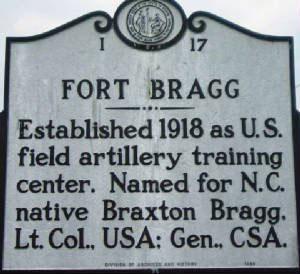 What do Southern U.S. Army posts have in common? They’re named after Confederate officers. The man for whom Fort Bragg was named was a military leader. Camp Bragg was established in 1918 as an artillery training ground and honored native North Carolinian Gen. Braxton Bragg, who also happened to be a slave owner. He commanded the Army of Tennessee in the Civil War and later was given command of the Department of North Carolina by Jefferson Davis. History records that he was loathed by his fellow generals. Author Earl Hess titled his most recent biography “Braxton Bragg: The Most Hated Man of the Confederacy.”
What do Southern U.S. Army posts have in common? They’re named after Confederate officers. The man for whom Fort Bragg was named was a military leader. Camp Bragg was established in 1918 as an artillery training ground and honored native North Carolinian Gen. Braxton Bragg, who also happened to be a slave owner. He commanded the Army of Tennessee in the Civil War and later was given command of the Department of North Carolina by Jefferson Davis. History records that he was loathed by his fellow generals. Author Earl Hess titled his most recent biography “Braxton Bragg: The Most Hated Man of the Confederacy.”
There are nine other posts named for Confederate generals and a colonel, including the head of the Army, the reported Georgia chief of the Ku Klux Klan and the commander whose troops fired the opening shots of the Civil War. Both the Army and the South are tradition-bound entities that revere their pasts. The naming of the posts came long after the Civil War.
Army Col. Steve Warren, a Pentagon spokesman, has said there is “no discussion” to rename the installations. That should put to rest the anxiety of Southern heritage traditionalists. “Every Army installation is named for a soldier who holds a place in our military history,” Brig. Gen. Malcolm Frost said. “These historic names represent individuals, not causes or ideologies.” Critics point out that with a rich history of American military leaders to choose from, it’s ridiculous to keep the names of Confederate generals.
In its outline of the history of naming Army installations, the Army notes, “It was common for camps and forts to be named after local veterans with a regional connection.” All 10 of the bases located in the South honor ranking officers who served in the Confederacy: Camp Beauregard, Louisiana, honors Louisiana native and Confederate Gen. Pierre Gustave Toutant Beauregard (1818-93, West Point class of 1838). He led the attack on Fort Sumter.
Fort Benning, Georgia, honors Brig. Gen. Henry Benning (1814-75), a Georgia lawyer, politician, judge and supporter of slavery. Fort Gordon, Georgia, honors Lt. Gen. John Brown Gordon (1832-1904). He was reported to be the leader of the state’s Ku Klux Klan and has “become for many Georgians, and southerners in general, the living embodiment of the Confederacy,” according to a Georgia Historical Society publication.
Fort A.P. Hill, Virginia, honors Virginian Lt. Gen. A.P. Hill (1825-65, West Point class of 1847). He had a frail physique and was frequently ill, attributes which some historians believe are linked to the gonorrhea he contracted while on furlough from West Point.
Fort Hood, Texas, honors Gen. John Bell Hood (1831-79, West Point class of 1853). Hood was wounded at Gettysburg. He led his troops in a massive assault during the Battle of Chickamauga, suffering wounds that led to the loss of his right leg.
Fort Lee, Virginia, honors Virginian General Robert E. Lee (1807-70, West Point class of 1829), the South’s commanding general by the end of the War Between the States.
Fort Pickett, Virginia, honors Maj. Gen. George Pickett (1825-75, West Point class of 1846), a Virginia native. Pickett’s 1863 charge at Gettysburg has been called “the high-water mark of the Confederacy” before ending up a Union victory.
Fort Polk, Louisiana, honors Lt. Gen. Leonidas Polk (1806-64, West Point class of 1827), an Episcopal bishop born in North Carolina. His immediate superior was Gen. Braxton Bragg.
Fort Rucker, Alabama, honors Tennessee native Col. Edmund Rucker (1835-1924) who was often called “general” but never attained the rank.

 How to resolve AdBlock issue?
How to resolve AdBlock issue? 








